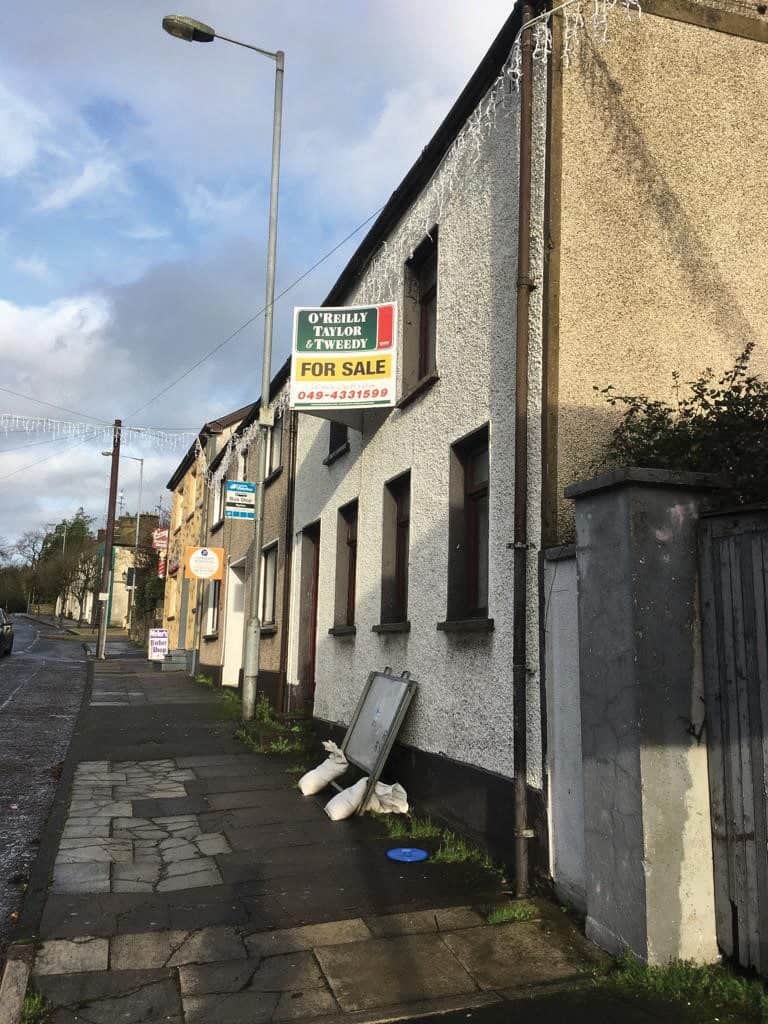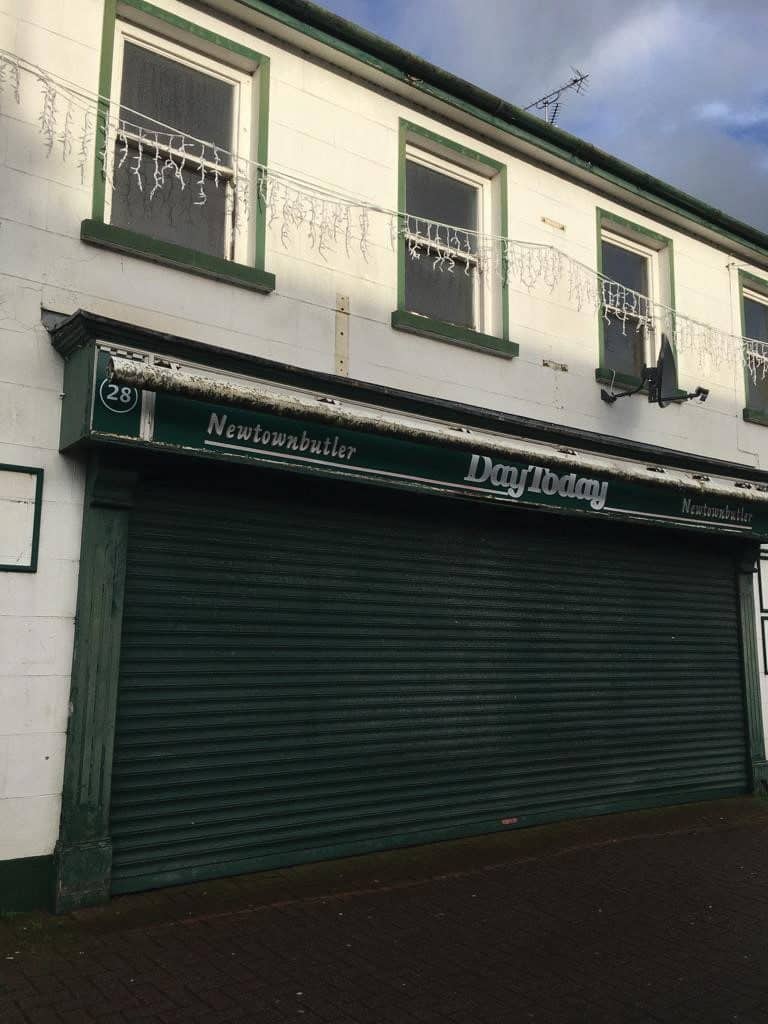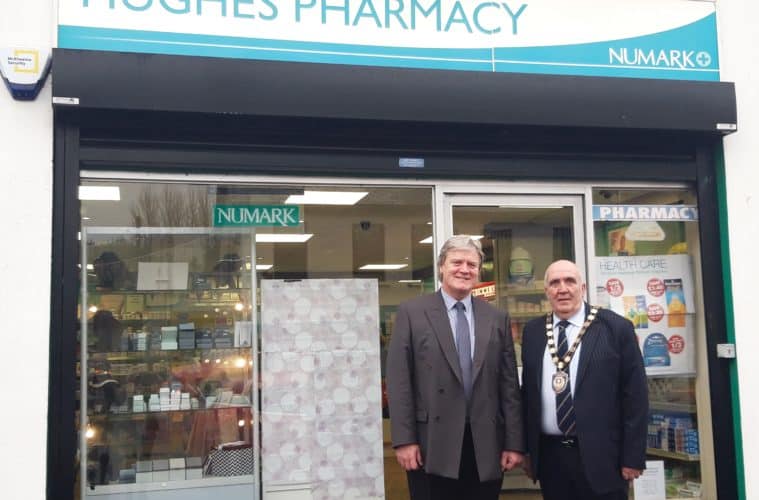If any more proof was needed that rural pharmacy in Northern Ireland is being gradually decimated, then you need go no further than what was once the picturesque village of Newtownbutler. PiF took a tour of the quasi ‘ghost town’ with local pharmacy contractor, Paul Hughes……
Eh, well no, actually, it doesn’t…
As I stand in the village’s only street, surveying the landscape with Paul Hughes, he gives me the lowdown on the current state of play.
‘This High Street that we’re looking at now,’ Paul tells me, ‘used to boast an array of businesses, including a hotel, a hairdresser’s, a convenience store and a bank. We also had two pubs, a butcher’s shop, a beautician’s and a haulage company.’
‘Over the last ten years, the convenience store closed, although we now have a small Spar store. One of the pubs is also running on reduced hours. The village has been totally decimated. I have had this pharmacy here for 30 years and I’ve never seen things so bad.’
(Since my visit to the village, the butcher’s has also closed.)
And things are evidently going to get worse.
The local GP surgery, which lies at the far end of the village was refurbished ten years ago but, since the resident GP retired a year ago, the surgery has been run on a temporary basis by GPs from the Lisnaskea Health Centre on a reduced-hours basis. A new health centre is planned for Lisnaskea in two or three years’ time and, once that is in place, Paul Hughes believes that the GP surgery in Newtownbutler will close completely.
‘At a time when we are watching our pharmacy colleagues across the water being funded to provide an increasing number of clinical services, it is absolutely soul destroying to see the result of the lack of investment in infrastructure in rural and border areas,’ he says. ‘This area in particular has one of the highest levels of social deprivation in Northern Ireland, and we have a lot of patients, who are receiving Disability Living Allowance.
‘I’ll give you an example of how difficult it is for patients here. If you wanted to go to Lisnaskea, then you need to get two buses during the working day, and, with the current bus timetables, it could be a good two or three-hour journey just to do a round trip. When you think of a young mum with a pram and maybe a couple of other kids, or someone who has bad mobility problems, then you can see how easily people can become isolated – and that in itself can lead to a raft of health problems – mental health problems in particular.
Newtownbutler is a small village in County Fermanagh, which borders County Monaghan. According to the 2011 census, the village is home to just under 1000 people.
According to Wikipedia, ‘the parish currently has two pubs, An Chead Chumann and Mulligans Bar and Lounge, which regularly host an array of events and attract crowds in from across the country. The village also has two shops, two takeaways, a butcher’s, a chemist, a credit union, a parish hall, a community centre, GAA grounds and a large community park up the town.’

‘The Lisnaskea GPs come down four days a week to run a satellite surgery, so I pick up scrips every day at 9am in Lisnaskea and also provide a delivery service. From where we are located, it’s three miles to the Cavan border, and three miles to Clones and the Monaghan border, so we’re doing business on both sides of the border in two different countries. Our cross-border trade has been reduced greatly because there’s absolutely nothing to attract anyone to come to Newtownbutler, and I dread to think what’s going to happen when Brexit kicks in and we’re dealing with the as-yet-undetermined problems of cross-border trade that are going to arise.
‘The problems arising from lack of funding in infrastructure have been compounded by the problems that have been created in pharmacy. As every pharmacy contractor in the North knows, what we’re witnessing now is the build-up and fallout from seven or eight years of underfunding by the government. In addition to the fact that we STILL don’t have a pharmacy contract, enquiry after report after review has confirmed that community pharmacy is being underfunded by between £20-£30m each year. What more evidence does the Department need that community pharmacy could play a vital role in increased services in primary care? Or that more funding is needed? The latest issue is that, even though the independent Cost of Service Inquiry showed once again that community pharmacy was being underfunded by up to £20m per year – and hence rural pharmacy is also being underfunded – the Department is choosing to ignore this vital piece of evidence.
‘Rural pharmacy has a separate section of the pharmacy budget. The Rural Pharmacy Access Funding was specially set up to allow for the lack of footfall experienced by pharmacies in locations such as this, but acknowledged that pharmacies were needed in such locations, and so the funding model is based on the number of scrips less than the NI average and on the distance from the nearest pharmacy. That means that if you have 1000 scrips a month, you’ll get more than someone who can fill 2000 scrips a month.
‘The problem with this funding model, however, is that it’s not permanent. It’s renewed from year to year and so the future every year is uncertain. That means that you can’t plan staff and services etc because you can’t forecast your cashflow accurately.
‘In the last year alone, I had to get rid of one part-time member of staff purely for financial reasons and I’m in the position at the minute where I can’t fulfil my pharmacy’s potential for carrying out services, or for doing outreach work, because I would have to pay locums to come in and stand in for me. Of course, that’s if I could GET a locum! Every contractor knows the problems that come with that minefield these days!
‘Then there’s the uncertainty over the fallout from Brexit. We simply don’t know the effect that it’s going to have on NI and ROI business in general, let alone pharmacy in particular. The fact that my pharmacy is practically on the border simply doubles the uncertainty over tariffs, supply, workforce, taxes…you name it. I just don’t know what the future holds and I know that my colleagues in similar locations are all desperately worried – and angry – about the situation in which we have been placed!
‘We desperately need some sort of certainty. We have received support from our local councillors, who have been both shocked and concerned at the lack of backing we have received from the Department and who are trying to help us to progress the community pharmacy agenda. We can only hope that their support will bring us dividends at some point. Howard Thornton, Chairman of Fermanagh & Omagh District Council has been particularly supportive, but I just don’t know how much anybody can do in the face of such adversity.’




